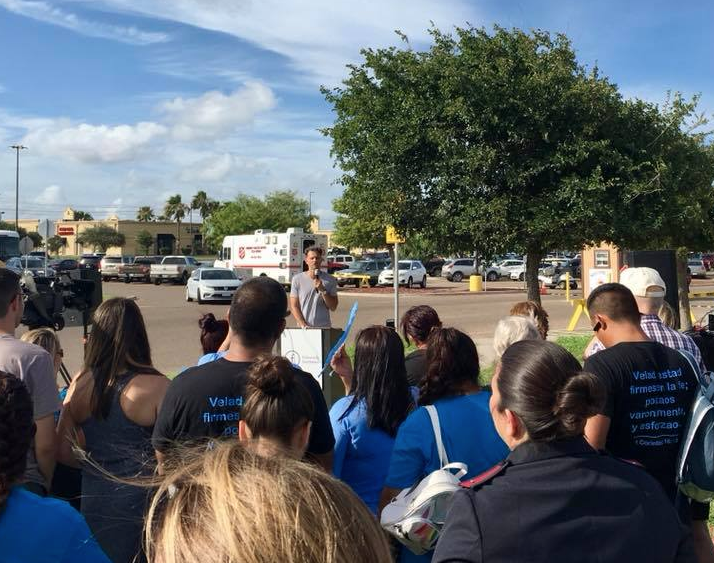Prayers for migrant children and prayers for ourselves

Last Sunday we drove nearly 500 miles from Waco to Brownsville, Texas, to pray. When we got there, what we really wanted to do was sneak through the fence, over a wall and through a window of the repurposed, former Walmart used to house children forcibly separated from their migrant parents.
We wanted to sit on the floor and hold babies, toddlers and preschoolers in our laps and wait with them until their mamas could come. We wanted to hear the names and listen to the stories of every child inside that facility. We wanted to shake the guards at the entrance by the shoulders and remind them that these are babies – children – someone else’s very best, most precious gift. We wanted to ask how on earth they could just stand there.
But we knew we could not get inside the building, the largest of the facilities where children from migrant families seeking asylum in the U.S. have been housed. Instead, we stood vigil with a group of people committed to praying, to speaking the injustice aloud and to declaring that our allegiance is to God – and that separating children from their families in this way is not only untenable but decidedly unbiblical, un-Christian and un-American.
We wanted to hold babies, to cry out against the Trump administration’s cruel and unjust policy and to bear witness to the pain experienced by 2,500 new children separated from their parents since May. We could not get close enough to hold babies. And there was not much we could do to challenge the policy or the practice. But we did what we could do: Pray. Hold vigil. And figuratively hold these and other traumatized migrant children in the light of God’s love.
This was our pilgrimage. While it didn’t cost us much of anything, it was an opportunity to humbly pray that the least of these, these marginalized and forcefully separated children of migrant parents – mothers and fathers fleeing poverty and violence to seek asylum and a better way of life for the sake of their children – might be seen for who they truly are. Each and every child in that compound is a beloved child of God.
Tourists pass quickly through places, but places pass slowly through pilgrims, leaving them forever changed.
We prayed prayers of welcome. We prayed prayers of confession. We prayed prayers of sorrow. We prayed prayers of hope. We prayed, “Christ, have mercy. God, have mercy!” And we promised, “No, not on our watch.”
We prayed with Christian leaders and faithful followers who live on the border. We thanked them for their passion and compassion, their faithful witness and their hope against hope that people who were coming over much like they had done would also find the opportunity they had pursued.
As we reflected on our journey, we learned from Father Thomas Rosica that “tourists pass quickly through places, but places pass slowly through pilgrims, leaving them forever changed.” As we gathered in vigil that night, our prayer was for the children. Our prayer was also that we might be pilgrims forever changed. Our prayer was that this journey might soon come to an end for these families traumatized by forced separation. And our prayer was that this border pilgrimage might continue to slowly pass through us as we consider our next response to this unconscionable crisis.
That night, at the end of the prayer vigil, a pastor asked us to raise our hands toward children. As we did so, we set our faces towards hope, with each other and with these children, and we prayed for God’s mercy and love. And as we prayed, that terrible place began to make its way into us and to slowly pass through us.
It was slowly passing through as we met local leaders and shared with each other messages of solidarity and resistance. It was slowly passing through as we walked into Mexico and back across the bridge where so many families cross each year. It was slowly passing through as we drove back talking about next steps in working for change. We are seeking to open our arms to children and families in ways that we should have done years ago, but that we might begin to do now, knowing it’s not too late.
This place will now continue to pass through us as we share the experience with friends, inviting them to take the time to study the policy and practice of both receiving and returning immigrant families. It will continue to pass through us as we cry out against any policy that would further separate families. Our nation’s leaders have declared an end to what was hopefully a short-lived zero-tolerance policy, but only new legislation will truly change the way families are treated as they make their pilgrimage toward the “golden door of opportunity” that our nation has promised to be.
Story first appeared on Baptist News Global website.